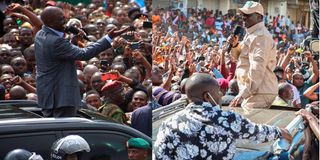Kenya no longer one-party state

President William Ruto (left) and Azimio leader Raila Odinga.
One sometimes can’t help feeling that President William Ruto wants to be the architect of his own downfall. If not that, then there must be Trojan Horses embedded deep within the administration actively working to bring him down.
This is the only conclusion one can draw from a series of actions that serve to reinforce the perception of people heavily intoxicated with power and suffering delusions that they can roll back the clock to the era of dictatorship.
Kenya achieved Independence from British colonial occupation through blood, sweat and tears. The Second Liberation was another long and hard-fought affair for which many patriots sacrificed life, freedom and personal comforts.
If any regime imagines that it can roll back the gains of democracy by denying people to right to assembly and association, muzzling the media and introducing repressive laws that purport to overthrow the constitution, it is committing treason and must face the consequences.
President Ruto is a beneficiary of the struggles for freedom and justice he so valiantly opposed in his younger days.
One-party state
He would not be president today if Kenya was still a monolithic one-party state, and if the attainment of freedom and justice did not guarantee him inalienable rights to build a political organisation and traverse the country without hindrance as he ran for the highest office in the land.
These rights could not be taken away from him by the Uhuru Kenyatta government that he disloyally served as the opposition within, and he cannot take away those rights from Kenyans.
The basic freedoms underwritten by the Constitution are not gifts or favours from the government. We don’t enjoy our freedoms courtesy of the president, Interior Cabinet Secretary Kithure Kindiki or Inspector-General of Police Japhet Koome.
Indeed if anyone as much as contemplates diluting the constitution they are sworn to obey, protect and defect, they are violating their oath of office.
Mr Koome is an old-school policeman, but he must still read the Constitution and understand that the era of the repressive police state ended many years ago.
Prof Kindiki is obviously much better-read than the police boss and definitely a much more agreeable character, so it is surprising that he lends his signature on plans to introduce laws that purport to over-ride the Bill of Rights.
Brute force
The extremist posturing we are seeing indicates a government in panic mode over the protests driven by opposition leader Raila Odinga. We are seeing a government at a loss on how to respond, and therefore resorting to brute force and abrogation of basic rights in ways that ultimately will curtail the freedom of all in Kenya, not only the protestors.
We have a history in this country of those puffed up with power imagining that they will rule forever, and that they will never be called to account.
They need to be constantly reminded that one day the boot will be on the other foot, and they will be the ones crying for protection from a brutal regime.
By purporting to outlaw Mr Odinga’s demonstrations and even mooting limitations on the rights of association and assembly, the government only succeeds in adding fuel to the fire.
It cannot issue illegal edicts on presumption that any marches will be violent. What it should do is engage the organisers and provide security.
Normal activities
In the process, of course, the organisers must engage the police on the itinerary, route and duration of the marches to ensure normal activities of those not involved are not affected. The organisers must also provide marshals and ushers to ensure their participants remain peaceful and orderly, and that those in their midst who misbehave are isolated and ejected.
By presuming violence and then unleashing violence, the police are using a rule book that belongs to the colonial state.
Wise leaders must be able to read the signs of the times and take the initiative before they are swept away in disgrace.
President Ruto is obsessed with looking over his shoulder, but instead of always pointing the finger at his predecessor Uhuru Kenyatta, he must look further back to their common political mentor in Daniel arap Moi.
Towards the end of 1991, President Moi read the signs of the times, ignored his rabid hardliners and acceded to demands for an end to single-party rule.
President Ruto must similarly ignore the insecure fellows around him, and seize the moment to forestall likely disturbances.
This need not be about acceding to Mr Odinga’s demands, but about recognising the need for a national dialogue and seeking the ceasefire that can make it happen.
[email protected]; @MachariaGaitho





